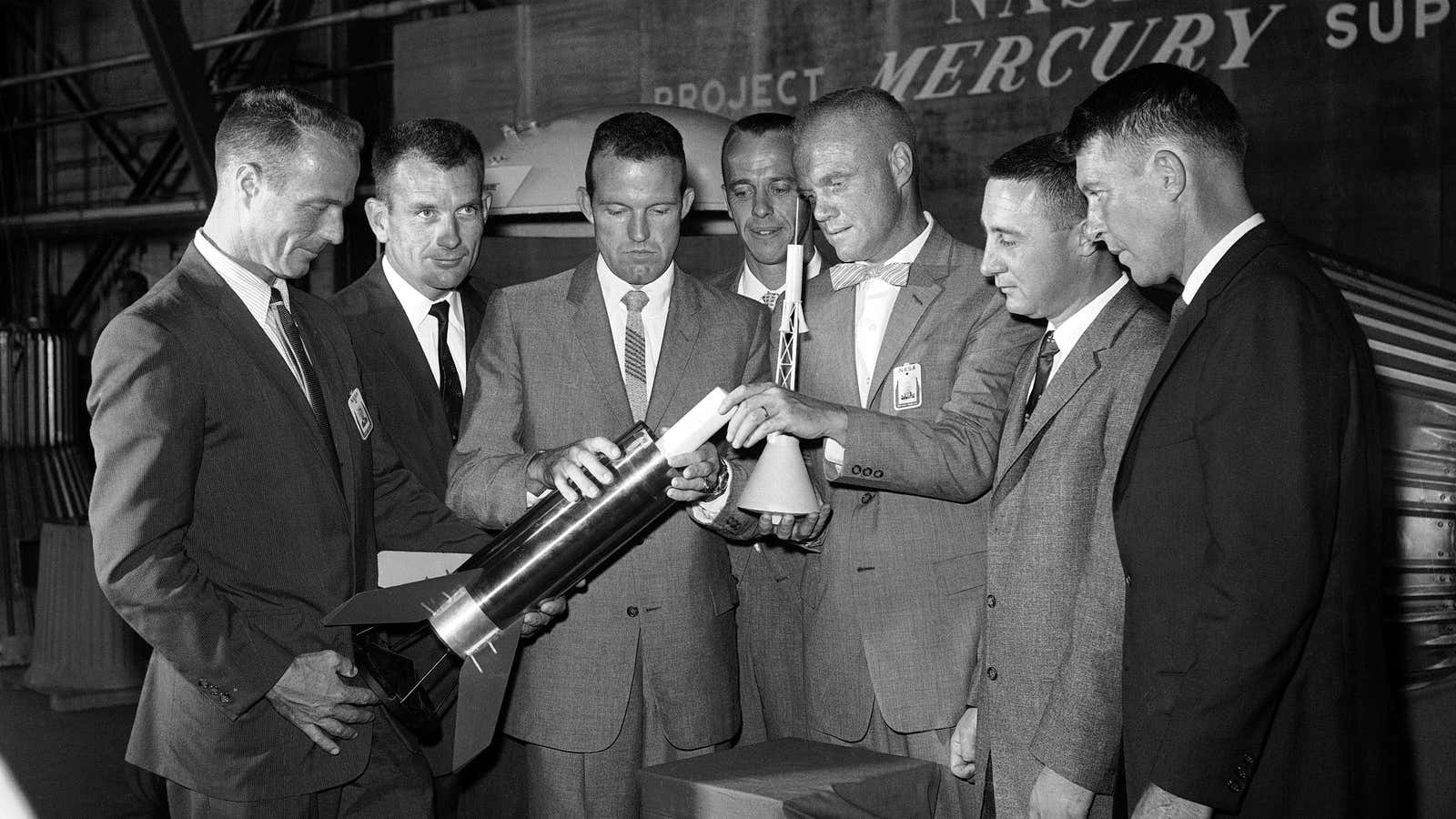“To this day, I’m not very interested in the actual exploration of space,” the late Tom Wolfe told a reporter during the book tour for The Right Stuff, his seminal tale of the first American astronauts.
Neither, as it turned out, was NASA.
In retrospect, the American government’s decision to devote a huge share of national resources to flying humans into space and then to the surface of the moon is astonishing. But despite the manifest destiny-inflected rhetoric, it was not driven by a yearning for new frontiers to explore. As Wolfe saw firsthand, it was the product of Cold War paranoia and an insatiable desire to generate proof of US superiority.
Today, his argument has become a truism. Scholars refer to that frenzy to explain why the US is no longer spending money hand over first on space technology. ”In an era when we needed to establish it, [the Apollo program] established that America has an economic and political system that is second to none,” NASA administrator Jim Bridenstine mused this week.
But when it was published in 1979, Wolfe’s angle was new.
“At long last a reporter has penetrated the plastic facade [of] NASA,” crowed a New York Times reviewer, who called it “a marvelously lucid account of why the Kennedy Administration felt it had to make a holy crusade of the Mercury Program and why the American people put away their plowshares and joined the throng.”
In Wolfe’s inimitable prose, the seven brave men who NASA’s propaganda juggernaut had made into the heroes of a new space age are seen as humans, whose virtues and successes were balanced by flaws and failure. They used, and were used, by the government. The real hero of the story isn’t an astronaut at all, but Chuck Yeager, the legendary pilot who defined the titular masculine sangfroid prized by Wolfe above all.
Of course, Wolfe’s insistence on interpreting the Mercury missions through the lens of single combat warfare obliterates the enormous engineering effort, by thousands of people, required to put an astronaut in space. Wolfe never completed a sequel covering the Apollo program, but it’s hard to imagine he would have given due credit to the black women mathematicians, engineers, and supervisors whose vital contributions were detailed in the book Hidden Figures.
In 2009, Wolfe lamented that the end of the Cold War left NASA without a proper mission, its budget reduced and what was left used more for economic development than a space exploration. He said it failed to articulate why humanity should go to space, ruefully noting that its most visionary thinker was Wernher Von Braun, “a former high-ranking member of the Nazi Wehrmacht with a heavy German accent.”
By the time of Wolfe’s death at 88 on May 14, however, he had witnessed the beginning of a new age of space exploration, driven by private investment from billionaires such as Elon Musk and Jeff Bezos. These new star-gazers share Wolfe’s vision of humanity expanding into the solar system, and would probably agree with Wolfe’s assertion that “we must not fail in this obligation we have to keep alive the only meaningful life we know of.”
Writing my own book about this new space race between SpaceX and Blue Origin, I kept The Right Stuff nearby to consult whenever I ran low on the productive anxiety that makes for good copy. It served as a reminder that space exploration can only proceed on faith alone for so long—and today, on the cusp of powerful new satellite networks, space tourism and the extraction of resources in space, humanity may finally find it worthwhile to live and work in space.
Still, at time when critics of NASA say the agency no longer embraces risk, it must eventually be passion that drives space exploration—which, as Wolfe showed with his New Journalism technique, cannot be explained so much as experienced. The Right Stuff ends on the question of when the accomplishments of men like Alan Sheppard and John Glenn will slip from American minds, a fever dream from another era.
After Wolfe’s death, Bezos tweeted a photo of those men and their comrades, and thanked Wolfe “for showing us all what it took to have ‘The Right Stuff.'” Wolfe could not have anticipated an era where the world’s richest man would construct spacecraft and rockets—but here we are, with Bezos’s New Shepard already flying, and the New Glenn slated for 2020. That’s the fever dream of our era.
